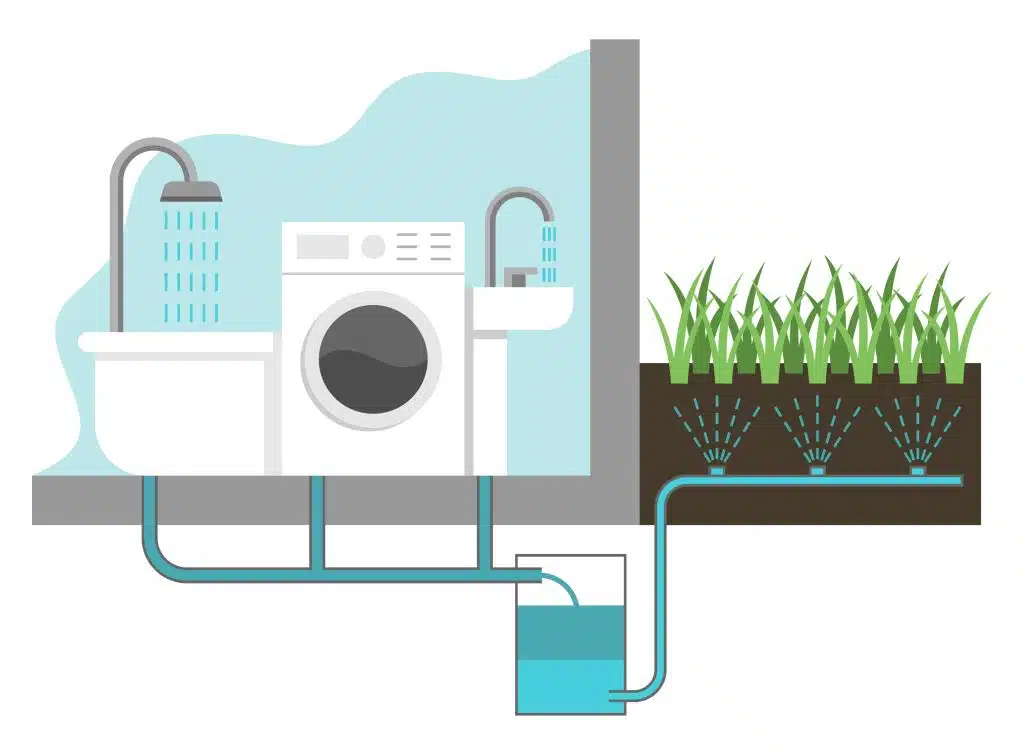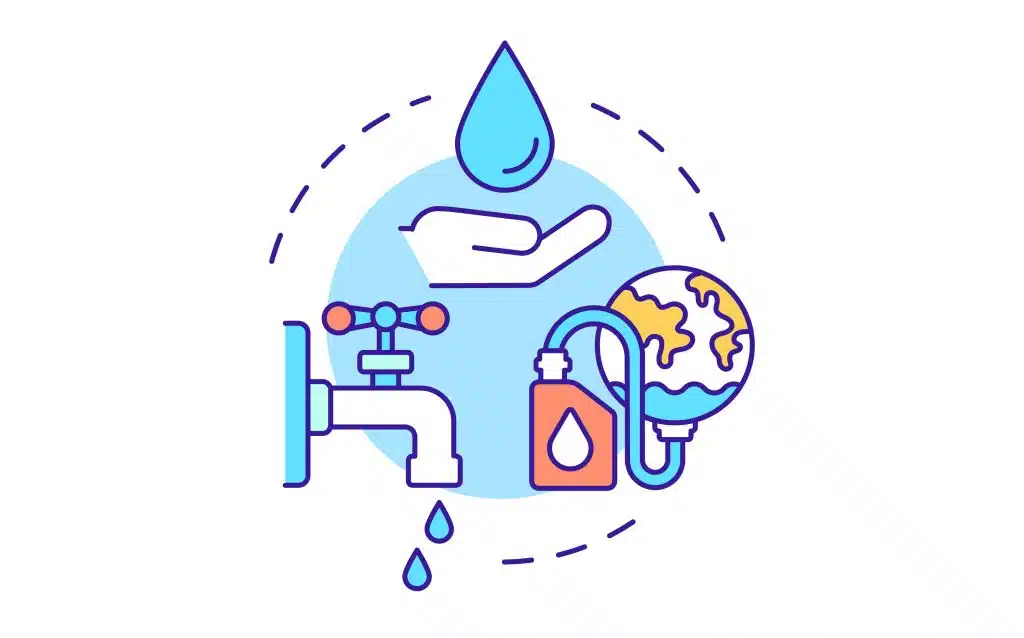Eco-friendly Solutions for Sustainable Water Use
Have you ever thought about how much water you could save with residential plumbing that reuses water in your home?
Greywater systems in residential plumbing are an innovative solution for sustainable living.
By recycling water from sinks, showers, and washing machines, homeowners can significantly reduce their water consumption and contribute to environmental conservation.
Benjamin Franklin Plumbing of Dallas specializes in installing and maintaining greywater systems.
Ensuring that homes in Richardson, TX, and beyond can enjoy the benefits of this eco-friendly technology.
In this guide, we’ll explore what greywater systems are, their advantages, and how you can implement one in your home.
What is Greywater?
Definition and Sources of Greywater
Greywater is the relatively clean wastewater generated from various household activities, such as baths, sinks, washing machines, and other kitchen appliances.
Unlike blackwater, which contains sewage and requires intensive treatment to remove harmful pathogens and contaminants, greywater is typically less polluted and can be reused for various purposes with minimal treatment.
Common sources of greywater in a household include:
Sinks:
This includes water used for washing hands, brushing teeth, rinsing dishes, and other similar activities.
Sink water is usually free from harmful contaminants, making it suitable for reuse after basic filtration.
Showers and Bathtubs:
Water from bathing and showering is another major source of greywater.
This water contains soap, shampoo, and body oils but is generally clean enough for reuse in applications like irrigation after simple treatment.
Washing Machines:
The rinse water from laundry loads, especially when using eco-friendly detergents, is a valuable source of greywater.
This water can be collected and reused for purposes such as flushing toilets or watering gardens.
By understanding these sources of greywater, homeowners can implement systems to capture and reuse this water, significantly reducing their overall water usage.
Difference Between Greywater and Blackwater
It’s crucial to distinguish between greywater and blackwater to ensure proper handling and reuse.
Greywater is typically less contaminated than blackwater, which contains fecal matter and urine from toilets.
The lower contamination level of greywater makes it suitable for reuse in applications such as:
-
Irrigation:
One of the most common and beneficial uses of greywater is for watering lawns and gardens.
Treated greywater can be directed to drip irrigation systems or subsurface irrigation systems, which efficiently deliver water to plant roots.
This method not only conserves fresh water but also provides an ample supply of moisture to keep gardens lush and lawns green, even during dry spells.
-
Toilet Flushing:
Using treated greywater to flush toilets is another effective way to reduce freshwater consumption.
Since flushing toilets accounts for a significant portion of household water use, repurposing greywater for this purpose can lead to substantial savings.
A greywater system can be designed to divert treated greywater directly to toilet cisterns, ensuring that the water is clean enough for this use and that the system operates seamlessly.
-
Cleaning:
Greywater can also be used for cleaning outdoor surfaces or vehicles.
Whether it’s washing driveways, patios, or cars, using treated greywater helps conserve fresh water that would otherwise be used for these tasks.
This application is particularly useful in regions with water restrictions, as it allows homeowners to maintain cleanliness without depleting their fresh water supply.
Proper handling and treatment of greywater are essential to prevent contamination and ensure safety.
Photo from iStock – Credit: bsd studio
Benefits of Using Greywater Systems in Residential Plumbing
Environmental Benefits
Implementing greywater systems in residential plumbing brings numerous environmental benefits. One of the primary advantages is water conservation.
By reusing greywater for non-potable purposes, households can significantly reduce their freshwater consumption.
This reduction eases the burden on local water resources, making them more sustainable over the long term.
Additionally, using greywater helps in reducing wastewater production.
Less water is sent to sewage treatment plants, which lowers the energy and resources required for wastewater processing.
This contributes to a lower environmental footprint and promotes a more sustainable lifestyle.
Economic Benefits
Greywater systems offer substantial economic benefits to homeowners.
By reusing water, households can experience cost savings on their water bills.
The reduction in freshwater usage directly translates to lower utility costs.
Over time, these savings can offset the initial investment in installing a greywater system.
In some regions, including Richardson, TX, there are potential tax incentives or rebates for homeowners who implement water-saving technologies like greywater systems.
These financial incentives can make the transition to greywater systems even more appealing and cost-effective.
Benefits for Local Communities
Beyond individual advantages, greywater systems also benefit local communities.
Reduced reliance on freshwater supplies helps enhance the sustainability of local water resources, ensuring that they remain available for future generations.
Furthermore, the decrease in wastewater production minimizes the strain on municipal sewage systems, leading to improved efficiency and reduced risk of overflow or contamination events.
By adopting greywater systems, communities can collectively move towards a more sustainable and environmentally friendly future.

Components of a Residential Greywater System
Collection Systems
The first step in setting up a greywater system is the collection of greywater from various household sources.
There are several types of greywater collection systems, each suited to different needs and configurations:
- Direct Diversion Systems: These systems immediately divert greywater from sources like sinks and showers to irrigation or storage tanks without any intermediate storage.
- Gravity-Fed Systems: Utilizes gravity to move greywater from collection points to the distribution area, often used in gardens and lawns.
- Pumped Systems: Employs pumps to transport greywater to higher elevations or distant parts of a property, suitable for larger homes or complex landscapes.
Choosing the right collection system depends on factors such as household size, landscape, and specific water reuse goals.
Treatment Systems
To ensure greywater is safe for reuse, it must undergo treatment to remove contaminants. Various treatment methods include:
Filtration Systems: Simple filters that remove particles and debris from greywater.
Biological Treatment: Utilizing microorganisms to break down organic matter, often in constructed wetlands or biofilters.
Chemical Treatment: Using chlorine or other disinfectants to kill pathogens and ensure water safety.
Effective treatment is crucial for maintaining the health and safety of household members and the environment.
Distribution Systems
Once treated, greywater needs to be distributed for reuse. Common distribution systems include:
- Irrigation Systems: Drip or subsurface irrigation systems that deliver greywater directly to plant roots, minimizing evaporation and water loss.
- Toilet Flushing Systems: Utilizing treated greywater to flush toilets, significantly reducing fresh water usage in the household.
- Cleaning Systems: Using greywater for non-potable cleaning tasks such as washing outdoor surfaces or vehicles.
Properly designed distribution systems ensure that greywater is used efficiently and safely throughout the home.
Implementing Greywater Systems in Richardson, TX
Local Regulations and Guidelines
Before installing a greywater system, it’s essential to understand the local regulations and guidelines that govern their use in Richardson, TX.
The city and state have specific rules to ensure that greywater systems are safe and effective. Key points include:
Permits and Approvals: Homeowners may need to obtain permits from local authorities before installing a greywater system.
System Design Standards: Adhering to design standards that ensure systems are constructed safely and sustainably.
Water Quality Requirements: Ensuring that treated greywater meets safety standards for its intended use, particularly for irrigation and toilet flushing.
Following these guidelines helps prevent contamination and ensures compliance with local laws.
Best Practices for Installation
Successful installation of a greywater system involves several key steps that must be followed meticulously to ensure optimal performance and compliance with local regulations.
These steps include:
-
Assessing Water Needs and Sources:
The first step is to thoroughly evaluate the household’s water usage to identify potential sources of greywater.
This includes examining the volume and frequency of water use from sinks, showers, and washing machines.
Understanding these patterns helps in designing a system that can effectively capture and reuse greywater.
-
Choosing Appropriate Systems:
Based on the assessment, it is crucial to select the right combination of collection, treatment, and distribution systems.
The chosen systems must align with the household’s specific needs and comply with local regulations.
For instance, some homes might benefit more from a gravity-fed system, while others might require a pumped system to transport greywater efficiently.
-
Professional Installation:
To ensure the system is installed correctly and operates safely, it is important to hire certified professionals.
Benjamin Franklin Plumbing of Dallas specializes in this area, bringing their expertise to every project.
Their professional installation services guarantee that the greywater system is set up to function efficiently and reliably from the start.
-
Testing and Monitoring:
After installation, regular testing and monitoring are essential to confirm that the system functions properly and meets water quality standards.
This involves periodic checks of water quality, system components, and overall performance to detect any issues early and address them promptly.
By addressing these steps thoroughly, homeowners can avoid common challenges associated with greywater systems, such as improper installation or inadequate treatment.
Following a detailed and systematic approach ensures a smooth installation process.
Maintenance and Upkeep
Maintaining a greywater system is crucial for ensuring its long-term functionality and safety, as well as for maximizing its efficiency and effectiveness.
Routine maintenance tasks are essential to keep the system operating smoothly and include several critical activities:
Regular Inspections:
Conducting thorough inspections regularly to check for leaks, blockages, or signs of system wear and tear.
These inspections help identify and address potential problems early, preventing more significant issues from developing.
Cleaning Filters and Components:
Regularly cleaning filters and other treatment components to remove debris and buildup.
Keeping these parts clean is vital for maintaining the system’s efficiency and ensuring that water flows smoothly through the system without obstruction.
Monitoring Water Quality:
Continuously monitoring the quality of the treated greywater to ensure it meets safety standards for its intended uses, such as irrigation or toilet flushing.
This involves testing the water for contaminants and adjusting the treatment process as necessary to maintain water safety.
Promptly addressing these maintenance tasks helps prevent operational issues, ensures the system continues to function as intended, and prolongs the life of the greywater system.
By staying vigilant with maintenance, homeowners can enjoy the full benefits of their greywater systems for years to come, contributing to water conservation and sustainability.
Case Studies and Success Stories
Local Success Stories
Implementing greywater systems has yielded impressive results for many homeowners in Richardson, TX.
Here are a few local success stories:
The Smith Family:
The Smiths installed a greywater system to irrigate their extensive garden.
With a gravity-fed system, they’ve reduced their water bills by 30% and enjoy a lush, green garden year-round.
The Johnson Household:
Facing high water bills, the Johnsons opted for a greywater system to reuse water for toilet flushing and outdoor cleaning.
They’ve noticed significant savings and appreciate the system’s environmental benefits.
The Martinez Family:
The Martinez family incorporated a biological treatment system to reuse greywater for their vegetable garden.
Their sustainable approach has not only conserved water but also provided them with fresh produce.
These stories highlight the tangible benefits of greywater systems and inspire others to consider similar solutions.
Benjamin Franklin Plumbing of Dallas Expertise
Benjamin Franklin Plumbing of Dallas boasts extensive experience in the design, installation, and maintenance of greywater systems, making them a trusted leader in this field.
Their deep expertise ensures that each greywater system is meticulously tailored to meet the specific needs of the home, all while complying with local regulations and standards.
Key services offered by Benjamin Franklin Plumbing include comprehensive consultation and planning, during which they assess a home’s water needs and develop customized solutions that maximize efficiency and sustainability.
Their professional installation services guarantee that greywater systems are installed correctly and operate efficiently, minimizing potential issues and ensuring long-term performance.
Additionally, they provide ongoing maintenance and support, which includes regular inspections, system upgrades, and troubleshooting to keep the systems running smoothly and safely.
With a proven track record of successful installations and a strong commitment to sustainability, Benjamin Franklin Plumbing of Dallas is the premier provider of greywater systems in Richardson, TX.
Their dedication to quality and customer satisfaction makes them the ideal choice for homeowners looking to adopt eco-friendly water solutions.
Conclusion
Greywater systems offer a practical and environmentally friendly solution for reducing water consumption and promoting sustainability in residential plumbing.
By reusing water from sinks, showers, and washing machines, homeowners can significantly cut down on their water bills, lessen the strain on local water resources, and contribute to a greener planet.
Implementing these systems requires an understanding of local regulations, careful planning, and professional installation, which is where Benjamin Franklin Plumbing of Dallas excels.
With their expertise and commitment to quality, Benjamin Franklin Plumbing ensures that every greywater system is designed to meet the specific needs of each home while adhering to local guidelines.
Whether you’re looking to save on water bills, reduce your environmental footprint, or comply with sustainability goals.
Greywater systems provide a compelling option for modern homeowners in Richardson, TX, and beyond.
Considering the many benefits and success stories associated with greywater systems now is the perfect time to explore this innovative solution for your home.
Contact Benjamin Franklin Plumbing of Dallas today to learn more about how a greywater system can transform your residential plumbing.
FAQs
-
What is a greywater system?
A greywater system collects wastewater from household sources such as sinks, showers, and washing machines, which are then treated to remove contaminants. This treated greywater can be reused for various non-potable applications, including irrigating gardens and flushing toilets. By recycling this water, greywater systems help conserve fresh water and reduce overall water consumption in the home.
-
How does a greywater system save money?
By reusing water, greywater systems significantly decrease the reliance on freshwater sources, resulting in notably lower water bills for homeowners. Additionally, many regions incentivize the adoption of greywater systems by offering tax incentives or rebates, making the investment more financially attractive and accessible.
-
Are greywater systems safe?
Yes, when properly installed and maintained, greywater systems are safe and reliable for household use. They require appropriate treatment processes to ensure the recycled water is free of harmful contaminants and suitable for its intended reuse purposes, such as irrigation and toilet flushing.
-
Do I need a permit to install a greywater system in Richardson, TX?
Yes, installing a greywater system usually necessitates obtaining permits and following local regulations to ensure the system is safe and compliant with legal standards. These requirements help guarantee that the installation and operation of the system do not pose any health risks or environmental hazards.
-
What maintenance does a greywater system require?
Regular maintenance of a greywater system involves routine inspections to check for any leaks or malfunctions, cleaning filters to prevent blockages and maintain efficient water flow, and monitoring water quality to ensure the treated greywater remains safe for reuse. These steps are essential to keep the system functioning efficiently and to safeguard the health of household members and the environment.
Ready to make a change in your water usage and contribute to sustainability?





